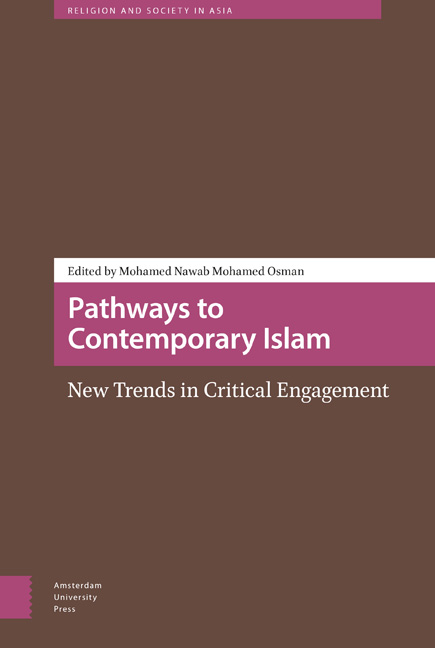Book contents
- Frontmatter
- Dedication
- Contents
- Acknowledgements
- Introduction: Constructing Pathways to Contemporary Islam
- Section 1 Historical Trends in Contemporary Perspective
- Section 2 Contesting the Islamic Intellectual Tradition
- Section 3 Beyond the Arab Revolutions: Political Islam Revised
- Section 4 Contemporary Spaces of Critical Engagement
- Notes on the Contributors
- Index
9 - Enhancing Dialogue Between Religious Traditions: An Islamic Perspective
Published online by Cambridge University Press: 25 November 2020
- Frontmatter
- Dedication
- Contents
- Acknowledgements
- Introduction: Constructing Pathways to Contemporary Islam
- Section 1 Historical Trends in Contemporary Perspective
- Section 2 Contesting the Islamic Intellectual Tradition
- Section 3 Beyond the Arab Revolutions: Political Islam Revised
- Section 4 Contemporary Spaces of Critical Engagement
- Notes on the Contributors
- Index
Summary
Abstract
This chapter provides an overview of Islam's historical experiences in interreligious dialogue through highlights of its ‘golden ages’ in this particular domain of multicultural societal living within its civilization. It examines these golden ages in interreligious dialogue in three notable geo-cultural and historical settings—Muslim-ruled Spain, Chinese Islam in Ming-ruled China, and Indian Islam under Mughal rule—following an introductory discussion of Muslim exemplary treatment of non-Muslims during the rule of the first four Caliphs succeeding the Prophet Muhammad. On the basis of this discussion the author concludes that it is generally the case that interreligious dialogue and cooperation presents itself as a necessary contributory factor of the Golden Age of all religiously pluralistic societies, especially of Islamic civilization.
Keywords: Sufism; Islamic philosophy; Sharia; comparative religion
A Historical Perspective
Historically, the now more than fourteen-centuries-year-old Islamic civilization founded in Medina in the first half of the seventh century CE stands on good ground to be considered as the first human civilization to have encountered and integrated into its socio-political order practically every major living religious tradition in the world that survives to this day. Moreover, classical Muslim historiography even added a good number of the minor or smaller religious traditions then in existence to this long list of Islam's cultural encounters with other religions and belief systems. These cultural encounters are made possible thanks to Islam's rapid physical and cultural expansion to the four continents of the world largely through military conquests but by no means confined to them.
Islam's evolving historical presence in the world that extended beyond the birthplace of its first socio-political order in the Arabian Peninsula to reach various continents was either physical or cultural and in some cases both. By physical presence I mean a noticeable existence of Muslim settlements or communities that exhibits their distinctive religious identity, particularly in the way they organize their collective or communal life. Underlying this communal life are beliefs and precepts which they all agree originated from the Quran and the Prophetic tradition (Sunna). And by cultural presence I understand it to mean a presence that is visible at two different levels, one tangible and the other intangible.
- Type
- Chapter
- Information
- Pathways to Contemporary IslamNew Trends in Critical Engagement, pp. 215 - 234Publisher: Amsterdam University PressPrint publication year: 2020



